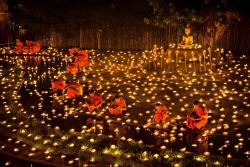Difference between revisions of "Vaishali"
| Line 4: | Line 4: | ||
[[毘舎離]] (Skt; [[Pali]] [[Vesali]]; Jpn Bishari) | [[毘舎離]] (Skt; [[Pali]] [[Vesali]]; Jpn Bishari) | ||
| − | The {{Wiki|capital}} city of the [[Licchavi]] tribe, a tribe belonging to the [[Vriji]] confederacy, one of the six-teen great states of {{Wiki|ancient India}}. [[Vaishali]] was one of the six major cities among the sixteen great states and prospered as a center of commerce. [[Shakyamuni Buddha]] visited the city on many occasions to {{Wiki|preach}}, staying at [[Great Forest | + | The {{Wiki|capital}} city of the [[Licchavi]] tribe, a tribe belonging to the [[Vriji]] confederacy, one of the six-teen great states of {{Wiki|ancient India}}. [[Vaishali]] was one of the six major cities among the [[sixteen great states]] and prospered as a center of commerce. [[Shakyamuni Buddha]] visited the city on many occasions to {{Wiki|preach}}, staying at [[Great Forest Monastery]] and elsewhere. Among the [[Buddha's]] followers in [[Vaishali]] was [[Ambapali]], a {{Wiki|courtesan}} who donated a {{Wiki|forest}} of [[mango trees]] to the [[Buddha]]. |
| + | |||
| + | The lay believer [[Vimalakirti]] also lived there. Toward the end of his [[life]], [[Shakyamuni]] visited [[Vaishali]] and spent his last [[rainy season]] nearby. The [[Second Buddhist Council]] was held in [[Vaishali]] about a century after the [[Buddha's]] [[death]], and [[tradition]] has it that [[King]] [[Ashoka]] erected a stone pillar in [[Vaishali]] in [[memory]] of the [[Buddha's]] visit there. | ||
| + | |||
| + | [[Vaishali]] is also known as the birthplace of [[Mahavira]], the founder of [[Jainism]]. [[Vaishali]] is [[thought]] to have been located at present-day [[Basarh]] in northwestern {{Wiki|Bihar}} [[state]]. | ||
</poem> | </poem> | ||
{{R}} | {{R}} | ||
Latest revision as of 08:36, 26 January 2015
Vaishali
毘舎離 (Skt; Pali Vesali; Jpn Bishari)
The capital city of the Licchavi tribe, a tribe belonging to the Vriji confederacy, one of the six-teen great states of ancient India. Vaishali was one of the six major cities among the sixteen great states and prospered as a center of commerce. Shakyamuni Buddha visited the city on many occasions to preach, staying at Great Forest Monastery and elsewhere. Among the Buddha's followers in Vaishali was Ambapali, a courtesan who donated a forest of mango trees to the Buddha.
The lay believer Vimalakirti also lived there. Toward the end of his life, Shakyamuni visited Vaishali and spent his last rainy season nearby. The Second Buddhist Council was held in Vaishali about a century after the Buddha's death, and tradition has it that King Ashoka erected a stone pillar in Vaishali in memory of the Buddha's visit there.
Vaishali is also known as the birthplace of Mahavira, the founder of Jainism. Vaishali is thought to have been located at present-day Basarh in northwestern Bihar state.
